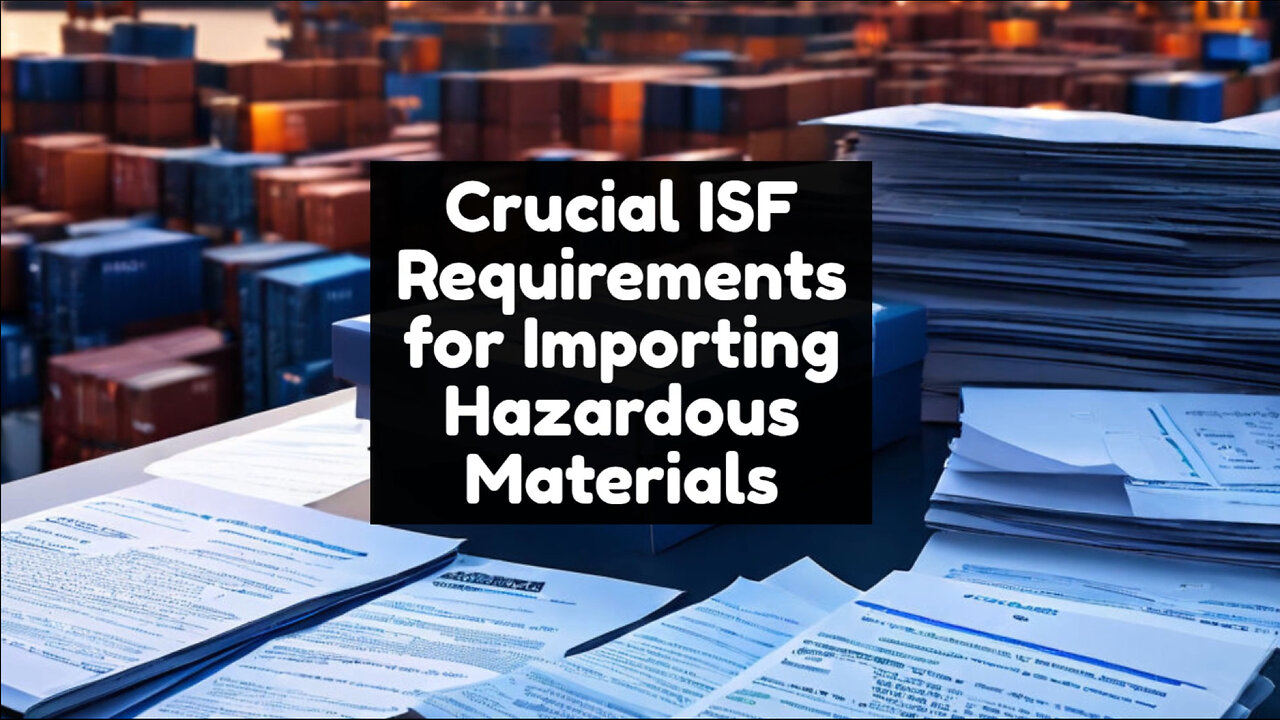Premium Only Content

Breaking Down ISF Requirements for Hazardous Material Imports
ISF Checklist || 805-970-7918 || contact@isfchecklist.com || www.isfchecklist.com
Welcome to today's episode on understanding the Importer Security Filing (ISF) requirements specifically for hazardous materials. The Importer Security Filing, also known as ISF or 10+2 filing, is a requirement by the US Customs and Border Protection (CBP) for ocean shipments entering the United States. It is designed to enhance maritime security by providing key information about the cargo before it arrives at the US port. The ISF includes details about the shipment, such as the importer, the carrier, and the contents of the cargo.
For hazardous materials, the importance of the ISF requirement increases even more. Hazardous materials pose various risks to the environment, public safety, and national security. Therefore, providing accurate and timely information about these shipments becomes critical. The ISF filing allows the CBP to assess and mitigate any potential risks associated with the importation of hazardous materials.
The ISF requirements for hazardous materials are similar to those for regular cargo, with a few additional key elements. Along with the basic information like the importer's name, the seller's name, and the bill of lading number, the ISF for hazardous materials must also include the hazardous material's UN number, proper shipping name, and the hazard class. Additionally, the ISF should provide details on the type of packaging, the number of packages, and the total quantity of the hazardous materials being imported.
Non-compliance with the ISF requirements can result in severe penalties and delays. The CBP takes the safety of the nation seriously and strictly enforces compliance. Failure to file the ISF or providing inaccurate or incomplete information can lead to monetary penalties, cargo holds, and even shipment refusal.
To ensure smooth customs clearance and compliance with ISF requirements for hazardous materials, it is highly recommended to work with a professional customs broker who specializes in handling such shipments. A customs broker will help you navigate through the regulations, prepare the necessary documentation, and ensure that your ISF filing is accurate and on time.
In conclusion, understanding the Importer Security Filing (ISF) requirements for hazardous materials is essential for seamless customs clearance and ensuring security in international trade. By complying with these requirements, you not only protect yourself from penalties and delays but also contribute to the overall safety of the nation.
#usimportbond
#isfcustomsbroker
#uscustomsclearing
#isfentry
Video Disclaimer Here: This video is purely educational and has no ties with the US government.
-
 16:38
16:38
SLS - Street League Skateboarding
14 days agoRayssa Leal's Most Clutch SLS Wins Ever! 🥶🏆
60.2K2 -
 1:06:29
1:06:29
Russell Brand
3 hours agoGaza Takeover? Trump’s Bold Plan Sparks Global Outrage – SF532
60.9K157 -
 1:57:32
1:57:32
The Charlie Kirk Show
2 hours agoGaza Thoughts + DOGE The Destroyer | Sen. Schmitt, Benz | 2.5.2025
62.5K9 -

Simply Bitcoin
3 hours ago $0.37 earnedNEW REPORT: Bitcoin ETF Insider Doubles Down on UNTHINKABLE 2030 prediction! | EP 1176
6.68K -
 LIVE
LIVE
The Dana Show with Dana Loesch
2 hours agoTRUMP PLANS TO TAKE OVER GAZA | The Dana Show LIVE On Rumble!
839 watching -
 59:36
59:36
The Dan Bongino Show
4 hours agoTrump Shocks The World With Major Announcement (Ep. 2416) - 02/05/2025
624K1.18K -
 1:19:04
1:19:04
The Rubin Report
3 hours agoTrump & Netanyahu Shock with Truly Unexpected Plan for Gaza
63.5K81 -
 1:59:23
1:59:23
Steven Crowder
5 hours ago🔴 Trump's Hitlist Grows: USAID, Dept. of Education, CIA, and... Gaza?
385K355 -
 57:49
57:49
Grant Stinchfield
2 hours ago $1.53 earnedThe FBI Withholds 5000 Names of Agents & Employees Who Hunted Down J6'ers
9.05K6 -
 2:02:40
2:02:40
LFA TV
18 hours agoMA-GAZA STRIP! | LIVE FROM AMERICA 2.5.25 11am
55.1K15